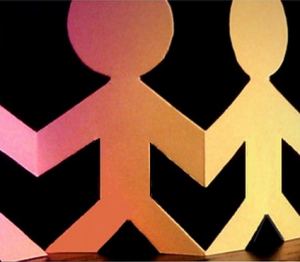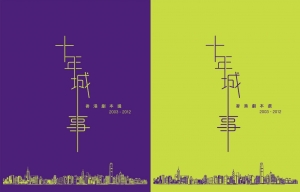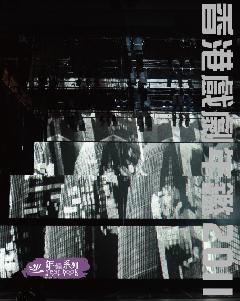Shed Skin lightly touches on a few themes, one of them on family relationship, another on breaking free. This short essay comments on how one has to face the choices and conflicts between individual freedom and the responsibilities of family. We question if we pursue one at the expense of the other through the mundane lives of the Suzukis, the relationship between father and son, and husband and wife.
The play starts with the ending. Takuya signs the papers to divorce Keiko 49 days after the death of Takujirou Suzuki, his father in his eighties, in the year Heisei 17, or 2005. Following that is the flashback of the previous few days during which Takujirou Suzuki underwent a fantastical rejuvenation, getting a decade younger with each shedding of skin, until father became younger than the son. Takuya gains insights to his father’s past life replayed in the present.
The drama portrays the Asian and Japanese family values of caring for the aged parents. Mitsuko had stayed in the hospital to look after her mother-in-law, and now, Takuya has returned to take care of his father. The elderly should be listened to, and consulted upon. Takuya heed his mother’s advice to get a stable job at the post office. When Takuya introduced Mitsuko to his father in his sixties, Takujirou asked if Keiko, his wife and Takuya’s mother, knew about the marriage. The divorce application form that awaits Takuya’s signature and stamp is always placed at the Bador altar for Keiko. Marriage and divorce require the blessing and approval of parents. We can’t act without giving them due consideration and respect. However, family is no more restraining our wishes and whims than our friends, workplace and community do, for we ask for the same thoughtfulness from others outside the family circle.
Mitsuko had raised the question of whether a relationship ended because of daily trifles or because of a crisis. She has behaved like a model wife and daughter-in-law. Her dancing before the father-in-law in his forties, according to Takuya, is entirely unexpected and somewhat out of character. There are social or conventional expectations on a wife and a husband. An individual could disregard them, or be under the influence or constraint of these norms. Takuya should not divorce Mitsuko for Risa, and Mitsuko should be forgiving of Takuya’s fling. It appears that she wants to divorce Takuya because of his affair with Risa. However, it should be noted that Takuya’s infidelity does not come out more frequently or prominently in her complaints. In fact, her anxiety started when she realized that it was difficult for her to get pregnant. To her, this is a setback to being a model wife. She could be living out her fallacy of losing her husband.
In Mitsuko’s frequent visit to Takuya, she was not just asking politely for the finalization of the divorce proceedings, but also still portraying a good wife and housekeeper in spraying air freshener and in reminding Takuya to wrap up the loose ends after the funeral, and a good daughter-in-law in her concern for Takujirou. There are little or no signs of hatred or animosity to Takuya. It seems that she has forgiven him. Takuya, in the end, agrees to stamp the divorce application, after realizing how Keiko had put up with his six fathers through the years. The typical happy ending would be a reconciliation. When Takuya earnestly proposed, instead of signing the marriage application form, Takuya and Mitsuko went through an almost ritual-like final collaboration of folding the application form into an airplane. She threw it up the air. He said, “Fallen!”. She said, “Landed!”. It was the end of their matrimonial journey with the paper plane touching ground.
Mitsuko’s reason of the divorce is not clear. My speculation on the divorce from her angle is that she will not be like Takuya anymore, passively waiting for a problem to go away and let change takes place on its own. Her resolution is to walk away from this marriage. She would finally do something that is not entirely within convention. This apparently provides a new opportunity for Takuya to resume his dream of making films. However, it should be noted that Mitsuko’s disapproval of his earlier film venture is not the filming itself, but the film content, suggested by the film title “Explosive Girl”, and the female lead for that film. Therefore, what holds Takuya from making films all along may be his acceptance of a stable civil servant job as the main cornerstone of a blissful life. The loss of this job at the post office brings about a threat which he should turn into an opportunity.
Throughout the play, the audience sees the same setting of a cluttered living area that serves as sitting-room, dining-room, kitchen and bedroom. In this tight enclosure of the physical accommodation that conveyed a stronger feeling of oppression and discomfort than warmth and coziness, Takuya has lived with his parents until he married Mitsuko. He returned, jobless, and alone, to take care of his senile father shortly after his mother passed away. Man in the washing machine and woman in the refrigerator add to the absurdity but at the same time reinforce the state of imprisonment. So do all the fathers exiting into the toilet and could not venture outdoors for new experiences. So do the paper airplanes that landed immediately in this confined space, never flying out of the open window. I do not imply that the conflicts in this drama will not arise if there is airy ample space. Each lives in a house, or flat, or room, and each also lives in one’s own skin. Our sensation of the surrounding is not just through the skin, but also through the heart and the mind. Shed Skin is also about breaking out of the skin, out of any walls that hold us captive.
The metamorphosis of the cicadas in its shedding of the shell is an additional motif. Sometimes, we are blinded to our own inertia, and we put barriers along our way, and create excuses for holding back from our pursuit of challenges and changes in our lives. Excuses like one’s loved ones will not want us to do it.
Throwing the paper airplane is about as absurd as Sisyphus rolling a rock up the mountain which will then roll down by its own weight. But Takuya seizes awareness of life meaning in the face of meaningless. He has not despaired from the ultimate hopelessness and limitations of his life. After his father’s death and his divorce, he was freer than before in a sense. He still needs a job, and now works for an electrical appliance shop. There is a hint of the start of a new relationship, as he uses the video camera borrowed from Kanaka. At the end, the back wall of the enclosed house opens up. The propeller of a plane is seen. Takuya excitedly took off to the horizon with the plane.
本網站內一切內容之版權均屬國際演藝評論家協會(香港分會)及原作者所有,未經本會及/或原作者書面同意,不得轉載。










